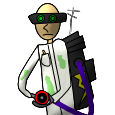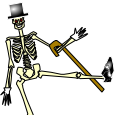I wrote this story for Machine of Death, Volume II, a collection of short stories about, basically, a machine that can predict how (but not when) you’re going to die. Unfortunately, they had almost 2000 submissions for 30 possible slots, and this one didn’t get in. I’ve read some the other rejected submissions people have posted and it seems I’m in good company, so I can’t wait to see the stories that actually made the cut.
“Alright,” the group leader said, “Now, to get to know each other a little better, let’s play some icebreakers.”
I groaned inwardly, and several of the other counselors groaned outwardly. I don’t know why we had to play the same stupid games as the campers. For that matter, I’m not sure why we even made the campers play them at all. It’s beyond me exactly how going around the room pairing our names with an adjective (He’s Tim, and he’s Tall. She’s Betty, and she’s Beautiful. That’s Sam, and he’s Smart. I’m Henry and I Hate this game) is supposed to help people connect to each other besides uniting under the belief that the counselors are idiots.
Of course, I had more of a reason to hate these kinds of games. Without fail, they always ended up with the death card guessing game. Ghoulish enough in its own right, of course, but even worse for me because it meant that another group of people was about to find out what my card said, and I was going to have to go through the same embarrassment all over again.
Most of the cards were fairly predictable. A handful of car accidents, a cancer, even an old age. I had a feeling that the poor guy whose card said “Heroin Overdose” (Mike, who claimed to be Musical) wouldn’t be here long. There were only three of us (me, Terrific Tina and poor little Xenophobic Xavier) left by the time my card was drawn. The group leader stared at it for a few seconds, as if he couldn’t believe it was real. Finally, he wordlessly turned the card around.
“Seriously?” a woman asked (Susan, who is Single. That one was a little desperate, if you ask me, but what can you expect from someone doomed to die of STARVATION?).
“Dying of shame?” another giggled (Francine, who is not as Funny as she thinks, and will die of a HEART ATTACK, probably caused when someone finally gets sick of her and pulls a gun on her).
I began to experience the familiar feeling that, apparently, would eventually kill me. My eyes sank and my face turned red.
“Is it yours, Henry?” Rob (who is Rambunctious, and will die in a CAR ACCIDENT) guessed.
I nodded slowly.
It’s amazing how big of an impact these little cards can have on your life, even besides the fact that they tell you how you’re going to die. Five years ago, when the machines had first come out, I was running for Senator, and doing well. All the polls predicted I was going to win by a landslide. Then my opponent, Jack Yarborough, made a huge public spectacle about getting his prediction, which turned out to be OLD AGE. I had to do it too, of course, and publicly. The machines were still new enough that people hadn’t realized quite yet that almost nobody got old age, and so I had just assumed that’d be my result too.
Every major news outlet in the area was there, waiting for the card to print. I stuck my finger in the hole and felt the prick that would change my life. Smiling, I waved the bloody finger at the camera as if to prove it really was my prediction I was about to receive. Three seconds later, a small click announced the fact that the card had printed. Wiping my finger on my handkerchief, I reached for the card. Despite my calm exterior, I was terrified. Everyone claims to want to know, but when it comes down to the moment you first look at your card, you realize you don’t. Once you know how you’re going to die, you can never go back. But by that point it’s too late. And as soon as I looked at the card, I knew it was too late for me, too. I knew that I would never be senator. Smiling, I turned it around and showed the cameras the five big block letters on the other side of the card: SHAME.
Jack, or should I say “Senator Yarborough,” won by a 90% margin that November. The worst part was, later on I found out he had gotten his prediction privately beforehand to make sure it was a “good” one. I always knew that guy was a bastard.
Everyone had seen my prediction, or at least heard about it at some point during the next thousand times it was mentioned on the news or in Jack’s smear campaigns. Having to walk down the street with people recognizing you as the wannabe senator who would die of shame was terrible. It was even, if I may say it, shameful. I looked online to try to find out if anyone else had ever gotten the same prediction. From what I could gather, I was unique. Though I suppose if anyone else had gotten it, they would have tried to keep it pretty quiet. I know I did after I moved across the country to a place nobody had ever heard of me except for, maybe, a couple of people who’d seen the YouTube video of my death card.
Unfortunately, the machine has proven time and time again that you can’t escape from your death, and in my experience you can’t escape from the stigma of your death, either. Most companies these days require you to submit to a test before employment. After the stink with the military refusing to accept people with a prediction of “gunshot,” the Supreme Court ruled that it wasn’t illegal to discriminate against people based on their cause of death if it’s likely that the death could be caused by the job or have a significant effect on the employer. Few precincts would accept police officers with a prediction of MURDER, X-ray technicians weren’t allowed to die of CANCER, fire departments obviously wouldn’t take you if you were fated to die of FIRE, and good luck getting any sort of manufacturing or construction job if your card read INDUSTRIAL ACCIDENT.
As it turns out, SHAME is vague enough that pretty much any employer could use it as an excuse. And most of them did. In the five years since I’d gotten my prediction, I’d been turned down or let go from more jobs than most people even apply for in their entire lives. Few people want to be associated with someone who is going to do something so terrible in the future that they will die of the shame associated with it. I would certainly never be able to get any kind of high-profile job. The risks would just be too great. I had a hard time understanding, though, how the fact I was going to die of shame meant that I couldn’t wash dishes at a local diner. Did they really expect that I’d die of shame from sending out a plate that I hadn’t cleaned well enough?
My wife had left me not long after I got my prediction (though she claimed that had nothing to do with it), and dating was difficult too, of course. These days, “what’s on your card?” had all but replaced “what’s your sign?” SHAME wasn’t nearly as exciting as a CAR CRASH, SKYDIVING ACCIDENT or even TETANUS, and like everyone else most women I met were afraid that if they associated with me my lethal shame would relate to them somehow.
By this point, I didn’t even know how I was supposed to die from shame. The shame that came as a result of having that prediction had gotten me pretty used to being constantly embarrassed.
I’d applied to be a camp counselor because I’d heard they don’t check your prediction. Officially, that was true, but apparently it was still impossible to avoid everyone finding out what it was. On the way out of the room, the camp director stopped poor Mike and started talking to him with a very apologetic look on his face. I was afraid he’d stop to “have a chat” with me too, so I waited until he was done.
“Hello, Henry,” he said after he was done, “Need something?”
“No sir,” I said. I left the room with a huge, goofy smile on my face.
The following few weeks were the most enjoyable time I’d had in my life for quite some time. Even though we inevitably played that damned icebreaker, the kids were young enough not to care. Most of them didn’t even know what “shame” really was. When I explained to them that it meant being embarrassed, they just laughed and didn’t understand how that could kill someone.
In short, things seemed to be going pretty well for me for once, until one day the camp director called me into his office.
“Take a seat,” he said, visibly uncomfortable. I’d never seen him like this before.
“What is it, sir?” I asked, sitting.
“Well,” he began, “Yesterday I got a troubling call from a parent of one of our campers.”
My heart immediately sank. I could tell by the tone of his voice that this wasn’t going to be good news, and I had a pretty good idea what the problem was.
“It seems that in one of the letters a camper wrote back home, they told their parent about the prediction guessing game, and apparently mentioned your prediction.”
Of course. My eyes began to lower as the familiar feeling took over.
“When they called, the parents brought up a…uh, good point,” he said. “You’re going to die of shame. Shame isn’t normally that big a deal. Lots of people feel ashamed all the time, so it would have to be something pretty terrible for someone to die of it…” he trailed off.
By this point, I wasn’t feeling shame, only anger. This was the worst rejection I’d had yet. “Are you accusing me of molesting campers?”
“No! No! Of course not!” he said, putting on his best “how-could-you-think-that” face. “It’s just that, well, these parents are a little concerned. I of course didn’t think that myself, but parents, you know how parents can be,” he chuckled. “If this gets out, they might not want to send their kids here.”
“What if I refuse to quit?”
“I would hope you’d be more reasonable than that,” he said, furrowing his brow. “But if not, we’ve been going over the budget the past few days. Camp enrollment for this year is quite a bit below what it was last year. It turns out we won’t need as many counselors this year, and so…” he shrugged.
It was a lie, and he knew I knew it was a lie. Unfortunately, there wasn’t much I could do about it.
He sighed. “I’m sorry, Henry, I really am, but there’s nothing I can do. Like I said, enrollment’s down as it is, if people start worrying about our counselors, too…” he shrugged helplessly. “I suggest you start packing. The van will take you back to town in a few days.” He started walking towards the door.
“Sir?” I said, “Can I ask you a question?”
He stopped, and turned his head to face me. “What?”
“What does your card say?”
He paused, thinking, then his face hardened. “That’s none of your business,” he said, turning back around and heading out the door.
On my way back, I realized he was wrong, and that I and everyone I know had been wrong this whole time. There wasn’t going to be one event so shameful that I couldn’t survive it. It was the small, constant indignities that piled up. The burden of having to deal with my prediction was going to wear me down and eventually kill me.
I was so lost in thought that I wasn’t paying attention to where I was going. Looking down, I realized I had just stepped in a pile of dog crap. And everyone else in the bunkhouse was going to smell it while I packed to go home. How embarrassing.
 A year ago today, I sent out the first invites and officially opened the doors of Pleasantville by Night to the public. I’d previously been involved with another game called Xenos (in fact, a lot of Pleasantville’s code is based off of it), but there I hadn’t been the only one working on it. There were others able to fix bugs, and to give me feedback on my content before I went live with it. Pleasantville was a solo effort, and I was nervous.
A year ago today, I sent out the first invites and officially opened the doors of Pleasantville by Night to the public. I’d previously been involved with another game called Xenos (in fact, a lot of Pleasantville’s code is based off of it), but there I hadn’t been the only one working on it. There were others able to fix bugs, and to give me feedback on my content before I went live with it. Pleasantville was a solo effort, and I was nervous. Most importantly…would people even like it? This was a world that nobody had seen but me, and here I was about to put it out there for everyone to see. I had no idea if other people would think the jokes were funny or if the content was too dark or bizarre. Would people I know start giving me strange looks, calling the whitecoats on me, or maybe performing impromptu exorcisms to cure me of what is obviously a case of demonic possession? (No demons here, aside from the ones in the game. This stuff’s all 100% me. I dunno if that’s better or worse).
Most importantly…would people even like it? This was a world that nobody had seen but me, and here I was about to put it out there for everyone to see. I had no idea if other people would think the jokes were funny or if the content was too dark or bizarre. Would people I know start giving me strange looks, calling the whitecoats on me, or maybe performing impromptu exorcisms to cure me of what is obviously a case of demonic possession? (No demons here, aside from the ones in the game. This stuff’s all 100% me. I dunno if that’s better or worse). For those of you who used to play, come on back! I’ve been putting a lot of effort over the past few months to make the game a lot more accessible. This round, for example, I massively simplified the stats so it’s more clear what things actually do. Give it another go…for me? (And if you still don’t like it, please, let me know why! I can’t promise I’ll make every suggested change, but if it’s a good idea, I probably will).
For those of you who used to play, come on back! I’ve been putting a lot of effort over the past few months to make the game a lot more accessible. This round, for example, I massively simplified the stats so it’s more clear what things actually do. Give it another go…for me? (And if you still don’t like it, please, let me know why! I can’t promise I’ll make every suggested change, but if it’s a good idea, I probably will). So, in the end, tl;dr as the kids say, thank you for playing Pleasantville by Night, or at least putting up with me talking about it. It’s been a great year, and I’ve got some good things in store for next year. They say the first year of running a browser-based massively multiplayer team-focused role-playing game is the hardest, right? (Please someone tell me they say that, I don’t know if I have the strength to keep going otherwise! This thing is horrible…I’m going gray!)
So, in the end, tl;dr as the kids say, thank you for playing Pleasantville by Night, or at least putting up with me talking about it. It’s been a great year, and I’ve got some good things in store for next year. They say the first year of running a browser-based massively multiplayer team-focused role-playing game is the hardest, right? (Please someone tell me they say that, I don’t know if I have the strength to keep going otherwise! This thing is horrible…I’m going gray!)